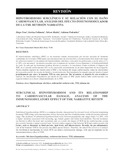| dc.rights.license | http://creativecommons.org/licenses/by-nc-sa/3.0/ve/ | es_VE |
| dc.contributor.author | Diego Tene, Nadia | |
| dc.contributor.author | Urdaneta, Geritza | |
| dc.contributor.author | Muñóz, Nelson | |
| dc.contributor.author | Pedreáñez, Adriana | |
| dc.date.accessioned | 2021-11-01T20:43:09Z | |
| dc.date.available | 2021-11-01T20:43:09Z | |
| dc.date.issued | 2021-11-01 | |
| dc.identifier.uri | http://www.saber.ula.ve/handle/123456789/47682 | |
| dc.description.abstract | El hipotiroidismo subclínico (HSC) es un trastorno común caracterizado por niveles elevados de hormona
estimulante de la tiroides (TSH) junto con concentraciones de tiroxina libre y triyodotironina libre dentro del rango
de referencia normal. La incidencia del hipotiroidismo subclínico varía entre las poblaciones y oscila entre el 4 y
el 20%, con una mayor incidencia asociada con el aumento de la edad, el sexo femenino y la biodisponibilidad
de yodo. Se sabe que las hormonas tiroideas afectan el corazón y la vasculatura. Como resultado, el impacto del
HSC en el sistema cardiovascular (SC) se ha convertido recientemente en un tema importante de investigación.
Varios estudios sugieren un vínculo entre el HSC y los factores de riesgo cardiovascular, como las alteraciones
de la presión arterial, los niveles de lípidos y la aterosclerosis. Recientemente ha tomado especial interés el papel
proinfl amatorio que ejerce la hormona TSH en estos procesos. Por tal motivo, el objetivo de esta revisión es
analizar los mecanismos bioquímicos por medio de los cuales el HSC puede inducir daño cardiovascular, con
especial énfasis en el efecto inmunomodulador de la TSH. | es_VE |
| dc.language.iso | es | es_VE |
| dc.publisher | SaberULA | es_VE |
| dc.rights | info:eu-repo/semantics/openAccess | es_VE |
| dc.subject | Hipotiroidismo subclínico | es_VE |
| dc.subject | Enfermedad cardiovascular | es_VE |
| dc.subject | TSH | es_VE |
| dc.subject | Inflamación | es_VE |
| dc.title | Hipotiroidismo subclínico y su relación con el daño cardiovascular. Análisis del efecto inmunomodulador de la TSH. Revisión narrativa. | es_VE |
| dc.title.alternative | Subclinical hypothyroidism and its relationship to cardiovascular damage. Analysis of the inmunomodulatory effect of TSH. Narrative review. | es_VE |
| dc.type | info:eu-repo/semantics/article | es_VE |
| dcterms.dateAccepted | Enero 2021 | |
| dcterms.dateSubmitted | Septiembre 2020 | |
| dc.description.abstract1 | Subclinical hypothyroidism (SCH) is a common disorder characterized by elevated levels of thyroid-stimulating
hormone (TSH) along with concentrations of free thyroxine and free triiodothyronine within the normal reference
range. The incidence of subclinical hypothyroidism varies between populations and ranges from 4 to 20%, with
a higher incidence associated with increasing age, female gender and iodine bioavailability. Thyroid hormones
are known to affect the heart and vasculature and, as a result, the impact of SCH on the cardiovascular system
has recently become a major research topic. Several studies suggest a link between SCH and cardiovascular risk
factors, such as alterations in blood pressure, lipid levels, and atherosclerosis. Recently, the pro-infl ammatory
role of the hormone TSH in this process has taken special interest. Therefore, the aim of this review is to analyze
the biochemical mechanisms by which SCH can induce cardiovascular damage, with special emphasis on the
immunomodulatory effect of TSH. | es_VE |
| dc.description.colacion | 73-81 | es_VE |
| dc.description.email | apedreanez@gmail.com | es_VE |
| dc.description.frecuencia | Trimestral | |
| dc.identifier.depositolegal | Depósito Legal: ppi. 200902ME4351 | |
| dc.publisher.pais | Venezuela | es_VE |
| dc.subject.institucion | Universidad de Los Andes | es_VE |
| dc.subject.keywords | Subclinical hypothyroidism | es_VE |
| dc.subject.keywords | Cardiovascular disease | es_VE |
| dc.subject.keywords | TSH | es_VE |
| dc.subject.keywords | Inflammation | es_VE |
| dc.subject.seccion | Revista Venezolana de Endocrinología y Metabolismo: Artículos | es_VE |
| dc.subject.thematiccategory | Medicina y Salud | es_VE |
| dc.subject.tipo | Artículos | es_VE |
| dc.type.media | Texto | es_VE |


